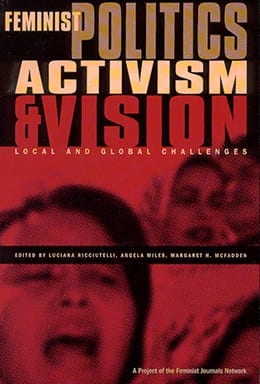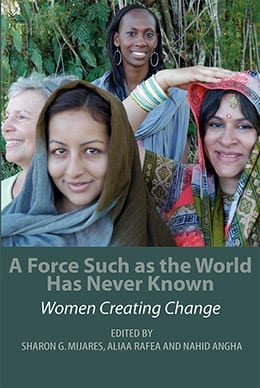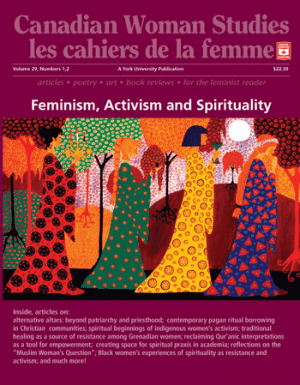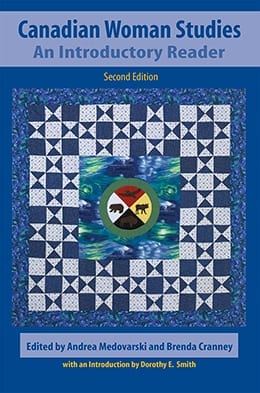This volume brings together essays of remarkable variety and fresh insights from leading feminists in Africa, Asia, Latin America, North America, Europe and Scandinavia. The engaged and sophisticated personal accounts, political speeches and academic articles collected here reveal a vibrant and multifaceted transnational feminist movement struggling not just for women¹s equality in existing structures but to redefine wealth, work, peace, democracy, leadership, family, human rights, development, community and citizenship. Contributors include: Arlie Russell Hochschild, Vandana Shiva, Charlotte Bunch, Bisi Adeleye-Fayemi, Nighat Said Khan, Sally Roesch Wagner and Alda Facio among many others.
“An invigorating book. You can feel the feminist intellectual and activist energy coming out of these pages. From corn seeds to the oil industry, from domestic work to the liquor trade, from the ‘war on terror’ to international alliance-building, these authors have deep feminist insights into how to theorize in ways that feed collective strategizing. Students and professors both will have their eyes opened by Feminist Politics, Activism and Vision.”
– Cynthia Enloe, Author of The Curious Feminist: Searching for Women in a New Age of Empire
“I cannot imagine how empty my life would have been without the presence of feminist writing. In this volume there are friends and new voices, and a rich fabric of text to anchor politics and clear vision in our activism.”
– Marilyn Waring, Author of If Women Counted/Counting for Nothing
“This fine collection of feminist writing from many parts of the world is an invaluable resource for those of us working locally with global perspectives. Here we read about women’s resistance to arrack production in India and oil production in Nigeria, feminists’ personal and political understandings of leadership, peace and human rights, and of feminists¹ resistance to the genderizing of their visions. We desperately need to share our experiences and analyses in this period of ascendent economic and religious fundamentalism and growing militarism.”
– Monica Munoz-Vargas, Unifem Regional Directior, Brazil and Southern Cone
“For millennia women have been in the forefront of peace-making and sustaining life and now, given the shambles and self-destructive nature of violence and war, our voices are invaluable. This volume makes visible the challenges faced by women in their important organized efforts to defend peaceful communities and cultivate a non-violent world.”
– Rosalie Bertell, Recipient of the Right Livelihood Award, the UNEP Global 500 Award and the Sean MacBride International peace Award.
Luciana Ricciutelli has been the Editor-in-Chief of Canadian Woman Studies/les cahiers de la femme, a feminist academic quarterly housed at York University in Toronto, since 1992. She is the editor (with June Larkin and Eimear O’Neill) of Confronting the Cuts: A Sourcebook for Women in Ontario (1998). Her creative writing has recently been published in the anthology, Mamma Mia! Good Italian Girls Talk Back, ECW Press, 2004.
Angela Miles is Professor of Adult Education and Community Development at the Ontario Institute for Studies in Education of the University of Toronto. Her publications include a co-edited collection of Canadian feminist writing, Feminism: From Pressure to Politics (1989) and monographs on Feminist Radicalism in the 80s (1985) and the global feminist movement, Integrative Feminisms: Building Global Visions, 1960s-1990s (1996). She is committed to building and studying autonomous women¹s local and global activism and its genesis and significance in the current period of neo-liberal globalization.
Margaret H. (Maggie) McFadden is Professor of Interdisciplinary Studies and Women’s Studies at Appalachian State University, Boone, North Carolina (USA), and was editor of the National Women¹s Studies Association Journal, 1997-2003. Her book, Golden Cables of Sympathy: The Transatlantic Sources of Nineteenth-Century Feminism, is published by University Press of Kentucky. She is currently at work on a book about international women activists in the period between the two world wars.
Acknowledgements 7
Preface
Peggy Antrobus
Introduction
Angela Miles
I. Neo-Liberal Context
Women: The Custodians
Vandana Shiva
Love and Gold
Arlie Russell Hochschild
II. Feminist Organizing: National, Regional and Global Frames
Global Politics and Transnational Feminisms
Jan Jindy Pettman
Feminist Networks, People’s Movements and Alliances: Learning from the Ground
Devaki Jain
Feminism, Peace, Human Rights and Human Security
Charlotte Bunch
Up Against the State: The Women’s Movement in Pakistan and its Implications for the Global Women’s Movement
Nighat Said Khan
Creating and Sustaining Feminist Space in Africa: Local and Global Challenges in the Twenty-First Century
Bisi Adeleye-Fayemi
Advocating Feminism: The Latin American Feminist NGO ‘Boom’
Sonia E. Alvarez
Organizing for Domestic Worker Rights in Singapore: The Limits of Transnationalism
Lenore Lyons
III. Women’s Local Struggles and Feminist Politics
The Curse of Nakedness: Nigerian Women in the Oil War
Terisa E. Turner and Leigh S. Brownhill
‘We Are That Mythical Thing Called the Public’: Militant Housewives in the US During the Depression
Annelise Orleck
Solidarity, Patriarchy and Empowerment: Women’s Struggles Against Arrack in India
Rekha Pande
Coming to Terms With the Past in Bangladesh: Naming Women’s Truths
Bina D’Costa
Missionary Women and Feminism in Norway, 1906-1910
Line Nyhagen Predelli
IV. Feminist Challenges in Practice and Vision
The Indigenous Roots of United States Feminism
Sally Roesch Wagner
Women’s Human Rights Activists as Political Theorists
Brooke A. Ackerly
Alternative Leadership in Africa: Some Critical Feminist Reflections
Sylvia Tamale
Testing the Limits of European Citizenship: Ethnic Hatred and Male Violence
R. Amy Elman
Feminist Intervention in the Rise of ‘Asian’ Discourse
Cho Haejoang
Back to Womanhood: Feminism in Globalized Israel
Erella Shadmi
V. Conclusion
The Empire Strikes Back But Finds Feminism Invincible
Alda Facio
Index








InannaWebmaster –
Reviewed by Jennifer Sumner
The history of women, like the history of many other subordinated groups, has emerged from the shadows of history written by the dominant group – in this case men. For this reason alone, Feminist Politics, Activism and Vision: Local and Global Challenges is an important book. Overall, it offers a panorama of the state of women’s struggles at the beginning of the third millennium that is unparalleled in its scope of coverage and depth of detail. In particular, it presents the current context of neoliberal globalization, the international scale of feminist organizing, case studies from the global South and the global North, and feminist challenges in both practice and vision.
Feminism itself has been a minefield for those both within and outside the movement, so the range of viewpoints in the book is laudable as well as vital. The contributors include pioneers of the second wave of feminism, feminist academics from around the world, and a new generation of globally savvy but locally committed activists. It is this transcultural range that gives the book its visceral excitement, international flavour and learning potential.
Peggy Antrobus prefaces the book with the warning that women’s gains are being jeopardized by the spread of neoliberal globalization and religious fundamentalisms, that women’s solidarity is being challenged by resurgent racism, and that women’s lives are being endangered by the militaristic ‘war on terrorism’ and the AIDS pandemic. To meet these challenges, she calls on women to pay attention to both their differences and their connections because together they are the strength of the movement. This becomes a recurrent theme in the book, especially what contributor Erella Shadmi calls “the politics of connection.”
The core of this politics of connection can be understood through the concept of women’s shared specificities. Developed in the writings of one of the co-editors, Angela Miles, women’s specificities include not only women’s shared oppression and life experience of reproduction, motherhood, the sexual division of labour and the control of women’s sexed body, but also their historical experience in taking responsibility for their community and its future, their moral commitment to social solidarity and their ability for long-term and multifaceted activism. These specificities, in turn, are filtered through what Miles refers to as feminist values, such as participation and collaboration, diversity and pluralism, and inclusiveness and consensus-oriented policy making. The result is an interconnected world-view in action that will benefit not only women, but also men, children, non-human life and the environment.
I learned a great deal from reading this book – for example, that the women of the Six Nations of the Iroquois Confederacy pitied their American sisters because they lacked the historical rights that Iroquois women enjoyed. When native people were forced to take up American citizenship, indigenous women lost these rights. I also learned that in Seoul, South Korea, feminism is almost non-existent. Instead of belonging to the women’s movement, today’s young women have joined what political economist Leslie Sklair has called the most successful social movement – shopping – which is able to mobilize millions into the streets every day. In the wave of capitalist development that has swept over Asia, they are “overwhelmed by the power of money” and have little interest in anything other than consumerism. And, finally, my distrust of postmodernism was confirmed when I learned how the de-politicization and de-radicalization of feminism was fortified by postmodernism’s emphasis on two areas. The first area is identity, which is constituted in the existing social order, overlooks power relations, hollows out the concept ‘woman’ and thus denies the possibility for political action and sisterhood. The second area is discourse, representation and performance, which abandon women’s experience as the main focus and leave the political field to the sway of the economic dictates of capitalist globalization. These postmodern emphases make the politics of connection almost impossible.
The conclusion is a fitting summary. Entitled “The Empire Strikes Back But Finds Feminism Invincible,” it assumes the point of view of a history professor from another galaxy lecturing on patriarchy in the twentieth and twenty-first centuries on “one of the least civilized planets of the universe.” This futuristic overview is at once pessimistic in the oppressive history it reveals and optimistic in its implication that feminism is invincible.
Overall, the blend of theoretical and practical analysis and activism provide a grounded vision of what feminism brings to the world. I would have enjoyed a case study of Canada, but I was more than compensated by the rich mix of global perspective, analytic depth and local examples. Jennifer Sumner is an Assistant Professor in the Department of Adult Education and Counselling Psychology, OISE/University of Toronto. Her research interests include sustainability, globalization, political economy and rural women.
InannaWebmaster –
Reviewed by Catherine Vance
This book is a project of the Feminist Journals Network it brings together a unique connection of essays from leading feminists from North America, Africa, Asia, Latin America & Europe. It is one of the most informative, interesting and stimulating books that I have ever read.
The book claims that the engaged and sophisticated personal accounts, political speeches and academic articles collected here reveal a vibrant and multifaceted transnational feminist community in struggle redefining wealth, work, peace, democracy, family, human rights, development, community and citizenship. This book certainly does not disappoint! The intellectual
ability, unquestionable knowledge and passion with which each piece has been written will leave any reader suitable impressed, impassioned and with better informed perspective on a wealth of subjects.
The background to this book is, in itself, amazing. Angela Miles tells of a group of feminist activists and journal editors from around the world who had arranged to meet in Halifax, Novia Scotia to look at the opportunity to work together and share knowledge. They had already formed the Feminist Journals Network of twenty-five journals in seventeen countries on four continents and they were keen to look at how to make their work more readily available to all. The week long event took place in September 2001 and they were in the process, on 11th September, of planning this first volume when news of the World Trade Center Bombing came through.
Angela describes the silence as initially deafening but it then provided them with an impetus and a sense of urgency to proceed with their planned publication. These were a collection of women with unparalleled knowledge and set of experience that they were desperate to share with the wider feminist community. Their personal and moral outrage and their political anger that outpoured within this shared environment provided them with a deeper feminist understanding than they would have achieved alone and it confirmed their commitment to work together.
Their work is a diverse collection of articles on crucial subject matter. The issue of globalisation and the challenges that this provides for women throughout the world are brought together here in an inspirational format that does, very realistically, highlight the fragility, and the importance,
of developing and nurturing links. Information and shared experiences of local linkages, dealing with specific issues, and also those on a national and global level are the fundamental core of the future development of the feminist movement throughout the world.
Paramount to the successful attainment of a more just and peaceful world for all citizens is the creation of an informed Œarmy¹ of women who are willing to share experiences, learn from each other and influence others at every level I am delighted to say that this book is a superb starting point for building that intellectual and emotive capability.
No matter what you current level of understanding, your commitment to feminist principle or your interest in world affairs may be you will find this a fascinating, emotional and empowering read.
Published in Women’s News (Belfast) in June 2005. Reprinted with permission.
InannaWebmaster –
Reviewed by Wendy Robbins
Claims of feminism’s demise have been greatly exaggerated, as readers of Herizons know. Just how varied and effective feminist movvements remain, despite economic restructuring, globalization and government cutbacks, is documented in vivid detail in this collection of essays produced by the International Feminist Journals Network.
The challenges women continue to face are immense. For example, this book includes an article about women’s efforts to stop the manufacture and consumption of arrack (a local alcoholic brew) in rural Andra Pradesh, India, and to stop the male violence against women which was its byproduct. Another discusses how women disrupted Nigeria’s huge oil industry‹the peasant women’s weapon was their nakedness.
Insights abound. Another discussion focuses on the global “care drain”‹the growing trend for women who normally care for the young, the old and the sick in rich countries as maids, nannies or aides.
Some of the contributors are well-known to Canadian feminists (including Peggy Antrobus, Charlotte Bunch and the late Arlie Hochschild) and others are not. They find their way around the postmodern reluctance to essentialize or universalize woman, while still holding to some notion of universal human rights. They avoid the paralysis of cultural relativism and overly academic theory, while still valuing diversity and cultural pluralism. Collectively, they articulate and celebrate the practical reasoning peppered with “strategic utopianism” of grassroots women’s movements in countries large and small all over the planet.
Their essays are written in plain language and show how changing social mores and practices can, incrementally and effectively, promote women’s human rights. Or, to put it the other way around, the value of universal human rights theory lies in its service to social change.
While many activists are busy to the point of burnout, others are there to remind us of the life-preserving, revitalizing potential of feminist movements. This readable and moving collection offers women-centred epiphanies of amazing grace and antidotes to the soulless excesses of globalized capitalism, deepening patriarchal religious fundamentalisms, and the Bush-Blair axis of militarism.
Wendy Robbins is co-moderator of the feminist listserv PAR-L, with more than 1,500 subscribers in a dozen countries.
Published in Herizons 20 (2) (Fall 2006): 40. Reprinted with permission.